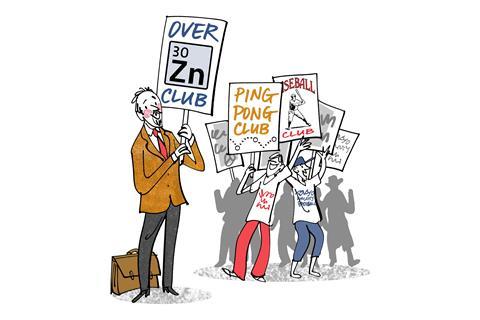What I learned from going back to university in my 30s

Established chemists are often asked what we would do differently, if we were to start our careers again now. This presents two problems: the world of chemistry has inevitably changed since we graduated and repeating a course we have already passed is somewhat improbable, however much some of us might benefit from the update.
Yet, as we change the world, the world transforms us in return: sometimes like work-hardening steel; sometimes like pigeons on a statue. Your working life could see you need to enrol on a different course to get a new position or make a career change; you never know the sudden effects that politics, your health or your relationships can have.
Long story short, I found myself in a new country, stuck there between career consequences and personal issues during Covid-19, needing to rebuild my life after it passed. Some pigeon; some statue! I needed to refine and certify my second-language skills to apply for research jobs. It was time for this 30-something to go back to school.
First impressions and starting out
During my first degree, I was just another student blending in. Mature students are hardly anything new but a middle-aged man in smart-casual wear among students slightly older than half his age certainly stands out. It feels strange when some staff worry you could be a trespasser, yet some students think you could be a staff member. In fairness, I used to lecture, just somewhere else.
To even get to initial registration in my department, I had to navigate a sea of placard-wielding society/club/circle/team members trying to press-gang me into some activity or sport for which I was no longer suited. After a 150-minute commute, definitely not. In most cases, I probably never was, but it is good to feel wanted.
Course registration has thankfully shifted online, with lotteries for oversubscribed courses. 18-year-old me, trudging around a campus all day finding seemingly randomly numbered rooms in unfamiliar buildings only to end up twelfth on a waiting list, would have his jaw drop through the Earth’s mantle with envy. I only hope the world of pharmacology is desired as much now as it clearly was then.
Challenges of studying
So what of studying itself? It seems every student has a laptop or tablet in front of them, which, however beneficial, seems strange to someone who had classes where brandishing a mere calculator would be considered cheating. Conversations about using generative AI for comprehension and creative writing tasks are now commonplace, but I always thought that using someone else’s work was cheating…
Coursework presents further challenges. Chemistry undergraduate me could finish it, then be free to do whatever. In later life, you are more likely to be not just a student who can use support, but someone who has to support family yourself. Add a long commute so you can be with them and you have subtracted considerable time.
Not only, but also
Making the most of your time is therefore essential, even if only to maximise free time. Teenage me thought he knew the academic route; 30-something me registered with the careers service on day one. Several courses on communication skills in my second language taught me valuable lessons I wish I had learned earlier for my first.
Take open units; the benefits may surprise you. After all, my introduction to this second language was a university open unit taken half my life ago. This time around, I took a chemistry course to familiarise thinking about it in my second language alongside native speakers. Even if my name was the odd one out. Even if the words sometimes escaped me and I looked like a dog trying to get attention.
Where it leads
When I started this course, I was a researcher who had taken a career break and needed to get back into work. Although not an easy thing to accept, I knew a research career may not be possible, but I had to face this course and job-hunt with an open mind if I wanted to get anything at all.
Thankfully, four months of commute later, I not only passed my courses, but through the advice of the careers service and external careers sites, as well as the language skills from the open chemistry unit, a company found me, waited for my course to finish, then took me on. Despite thinking it may never happen, I am a chemistry researcher again.
So, if I were to be a chemistry student again? Use the careers service, take open units for additional skills and find the project, then the job, that you want to do. Aim for something, yet prepare for anything; you may well be surprised by what you find.












No comments yet